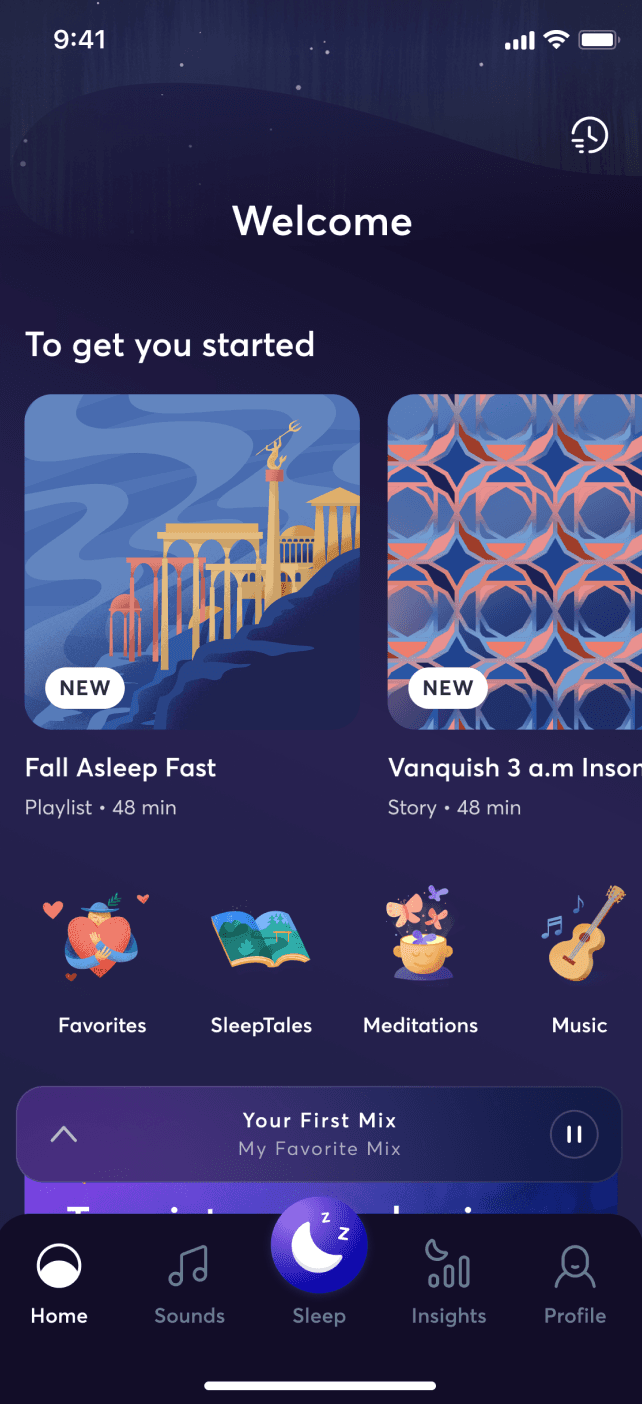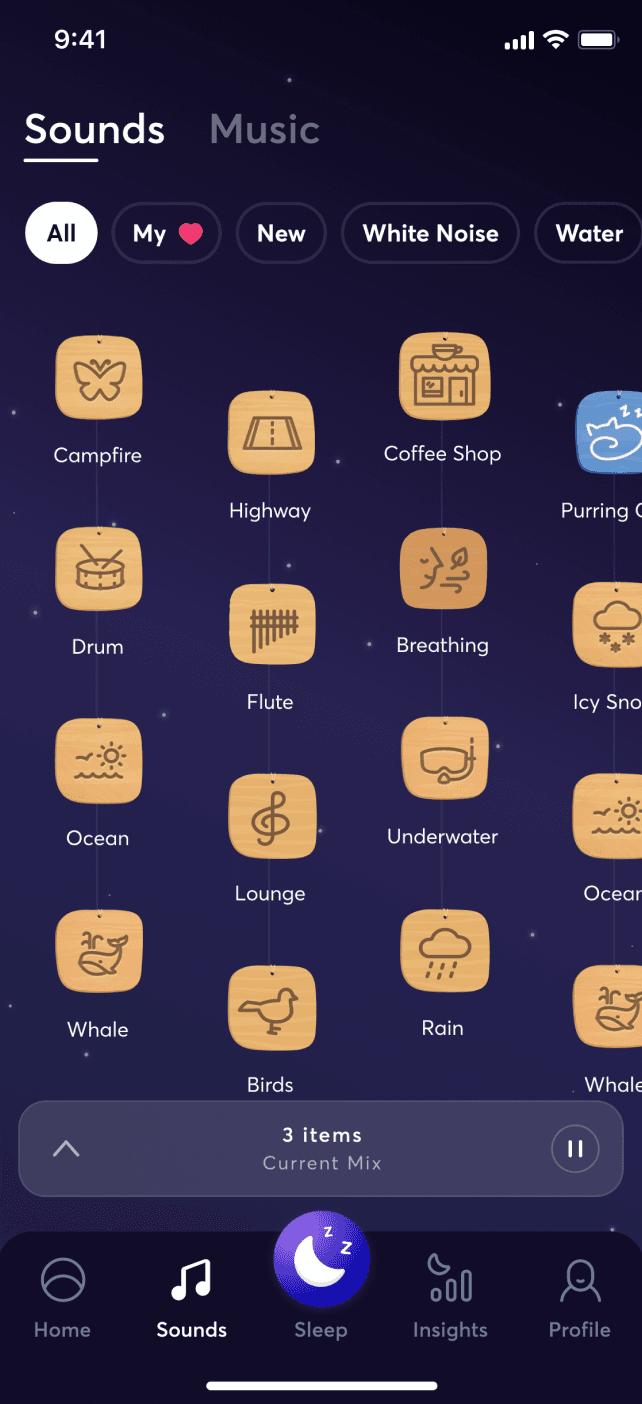
Why do people like background noise?
People like background noise because it can improve focus by masking distracting sounds, enhance creativity with ambient noise, or provide comfort and reduce stress by blocking silence and other unwanted noises.
For more about In this blog post, we'll explore why background sounds are so important and how they can influence our moods and emotions. We'll also look at some of the most common background sounds and their effects on us.
For sleep sounds read more here.
The Science of Sound and How It Affects the Brain
Sound is created by vibration, and when those vibrations reach our ears, they are converted into electrical signals that the brain interprets as sound. How sound affects the brain can vary greatly. It can elicit emotional responses, trigger memories, or even change brainwave patterns and alter states of consciousness.
One important aspect of sound and its effects on the brain is the concept of frequency. Different frequencies can have different effects on the brain and body, with some frequencies being calming and others causing stress or alertness. This is why certain sounds, such as white noise or ocean waves, are used for relaxation or sleep aids.
Sound can also have a physical effect on the brain through a process known as "bone conduction." This is when vibrations from sound travel through bones in the skull directly to the inner ear nerves, bypassing the middle ear and outer ear entirely. This can result in increased stimulation of certain parts of the brain and has been used in treatments for conditions like tinnitus or high-frequency hearing loss, also called sensorineural hearing loss.
While sound can have positive effects on mood and cognition, it can also have negative consequences if it is too loud or consistent. Prolonged exposure to loud noises can lead to permanent hearing problems and even changes in brain processes and structure.
Overall, understanding how sound affects the brain's ability to process information can help us better manage our environment. It can also help optimize our auditory experiences for normal hearing, optimal health, and well-being.
The Role of Background Sounds in Our Daily Lives
In today's fast-paced world, it can be hard to find a moment of peace and quiet. Even when trying to relax or focus on a task, we're often bombarded by loud sounds from our surroundings. It's no wonder, then, that so many people have begun seeking out background sounds as a way to create a more calming environment.
Whether it's the sound of rain falling, waves crashing against the shore, or white noise, these gentle noises can help mask the jarring sounds of the outside world and promote a sense of tranquility. In addition to providing a sense of peace, background sounds can also help to boost concentration and productivity.
Studies have shown that mild background noise can improve focus and creativity, while too much noise can be distracting. As such, background sounds can be an effective tool for helping us to relax or get work done. Whether we're seeking a moment of respite from the chaos of daily life or looking to boost our productivity, background sounds can offer a welcome respite.


What Types of Background Sounds Do People Prefer?
There is no definitive answer to what types of sounds people prefer, as individual preferences vary greatly. However, research has shown that certain patterns and trends do exist. Some popular types of sounds for the background that people like include:
Ambient Background Noise
One type of sound that people often prefer in certain situations is ambient background noise. This refers to low-level sounds that provide a sense of atmosphere, such as the hum of a coffee shop or the gentle crashing of waves on a beach.
Research has shown that ambient background noise can enhance creative thinking and problem-solving abilities. In contrast, complete silence can sometimes lead to increased levels of stress and distraction.
Some people also find ambient background noise comforting and soothing, especially in environments where they may feel anxious or overwhelmed. This can be particularly helpful for individuals with auditory processing disorder or autism spectrum disorder.
However, it is important to note that the effects of ambient background noise are individualized and subjective. Some people may find it distracting or irritating, while others may find it helpful. It is also important to consider the volume and type of ambient noise – too much or too loud of a sound can be disruptive and lead to temporary hearing loss.
It is possible that you are experiencing moderate hearing loss if you have difficulty hearing when there is background noise. In situations like this, wearing hearing aids can be beneficial. If using a hearing aid is ineffective, you should see a hearing specialist for some hearing tests and auditory training.
Overall, ambient background noise can provide a sense of atmosphere and enhance creativity and focus for some individuals, but it is important to consider personal preferences and adjust sound levels accordingly.
Nature Sounds
Another type of sound many people prefer is nature sounds. These can include the chirping of birds, the rustling of leaves in a breeze, or the calming sound of rain falling on a roof. These sounds have been shown to decrease stress and improve overall well-being. Additionally, studies have found that exposure to natural sounds can improve cognitive function and increase creativity.
Some ways to incorporate nature sounds into daily life include taking walks in nature, listening to recordings of natural environments, or simply opening windows to let outdoor sounds in. Incorporating nature sounds into one's daily routine can provide numerous benefits and improve the overall quality of life.
Music Backgrounds
Generally speaking, people tend to prefer music with a background or genre that they are familiar with and enjoy. This could be anything from classical to pop to indie rock.
One reason for this preference is that familiar music activates the reward center in the brain, leading to feelings of pleasure and contentment. Additionally, familiar music can also trigger strong emotional connections and memories.
Overall, while certain music backgrounds may be more universally preferred due to their ability to elicit positive reactions and emotions, individual tastes should always be respected and celebrated.
Human Voices
The human voice is another type of background sound people like. This preference can stem from various reasons, including the fact that humans have evolved to pay attention to and understand vocal communication. Additionally, the human voice can convey a range of emotions and expressions that other sounds may not be able to convey as effectively.
Another reason for the preference for the human voice could be personal connections and relationships. For example, hearing the voice of a loved one can evoke feelings of comfort and familiarity. In contrast, hearing unfamiliar voices or voices associated with negative experiences may elicit discomfort or distress.
Sound Effects
One type of sound that people often prefer is sound effects, which are artificially created or enhanced sounds used to enhance the atmosphere or mood of a film, television show, video game, or other forms of media. These sounds can range from simple background noises like rain falling or birds chirping to more extravagant effects like explosions or creature roars.
Overall, sound preferences are highly subjective and influenced by a variety of factors including personal taste, cultural background, and familiarity.


How Much Noise Do You Need?
In general, the lower, the better. But it's not quite that simple. Some people like to have background noise (e.g. television, music) while they work, while others prefer complete silence. And some people find that certain types of noise (e.g. white noise) can actually help them focus. So it really depends on the person.
Some people are more sensitive to noise than others, and what one person finds distracting may not bother someone else at all. If you're not sure what works for you, it's worth experimenting with different levels and types of noise to see what helps you concentrate the best.
Generally, music and background noise should be loud enough that you can hear and benefit from them but not so loud that it distracts you, causes noise-induced hearing loss, or bothers others. When it comes to listening to music while you work, sound levels should be around 65 dB – 75 dB, where 70 dB is about as loud as a normal conversation taking place a few feet away from you.
Listening to music at a moderate volume can help you focus and be more productive while listening to music that is too loud can actually interfere with your ability to concentrate. Ultimately, it is up to you to experiment with different volumes and find what works best for you in different situations.
What are the Benefits of Background Sound?
Research shows that background noise or music has several benefits, including the following:
Improved Cognitive Performance
It has long been known that music can positively affect cognitive performance. Studies have shown that listening to music can improve mental health and various cognitive functions. Now, it seems that background noise may also have benefits for cognition. It is believed that background noise helps to stimulate the brain and improve attention span. As a result, people are better able to process information and come up with creative solutions. So, if you’re looking to boost your brainpower, working in noisy environments might be worth trying.
Stress Relief
Listening to music has been shown to be an effective way to reduce stress, and it seems that background noise may also help to relieve stress. One study found that people who worked in a noisy environment were less stressed than those who worked in a quiet environment. It is believed that background noise helps to mask stressful thoughts and worries, which leads to a feeling of relaxation. So, if you’re feeling stressed, try working in noisy places and see if it makes a difference.
Improved Mood
Studies have shown that music can improve mood and reduce anxiety. It seems that background noise may also have benefits for mood. One study found that people who worked in a noisy environment were more likely to report a positive mood than those who worked in a quiet environment. So, if you’re looking to improve your mood, working in a noisy environment might be worth trying.


Caveats of Background Sound
First, there is the issue of whether the benefits of background sound are sustainable in the long term. That is, it is possible that the benefits may only occur when the background sound is new or novel. Once the background sound becomes familiar, it may no longer have any benefits. This is an important issue to consider, as it suggests that the benefits of background sound may be limited in scope.
Secondly, there is variability in the benefit that background noise has on different people. That is, not everyone experiences the same benefits from background noise. This is likely due to individual differences in how people process and attend to auditory information.
Thirdly, there is variability in the benefits that different types of background noise have on different people. That is, not all types of noise are equally beneficial. Different people may prefer different types of noise, and some types of noise may be more beneficial for certain tasks than others.
Thirdly, there are potential drawbacks to using background sound, such as the possibility of creating a distracting or stressful environment. When using background noise, it is important to be aware of these potential drawbacks.
Finally, it is important to keep in mind that the benefits of background sound are likely to be task-dependent. That is, different tasks are likely to benefit from different types and levels of noise. So, it is important to consider the task at hand when choosing background noise.
What are the Drawbacks of Listening to Background Sound?
- Listening to background sounds can be distracting and make it difficult to focus on a task.
- Background sound can also disrupt sleep, causing insomnia or difficulty falling asleep.
- Some people find that listening to background sounds can increase their anxiety levels.
- Finally, listening to background sound can also lead to dependence and addiction. Some people find it difficult to go without listening to background sound for extended periods of time. This can interfere with work, school, and social obligations.
If you are considering listening to background sound, it is important to be aware of the potential drawbacks. Listening to background sound can be beneficial in some situations, but it is not right for everyone. If you find that listening to background sound is interfering with your life in a negative way, it may be best to avoid it altogether. Perhaps you may undergo a hearing test to find out if you have any underlying issues causing the problem.


Avoiding Background Sound Altogether
One way to cut down on background noise is to use noise-canceling earplugs. These earplugs create a sound-proof barrier around your ears, which can help you focus and concentrate on your work.
Another way to reduce background noise is to turn down the volume of any devices you use. For example, if you're working on a project with music playing in the background, try turning the volume down, so it's not as distracting.
Finally, if you find that you're still struggling to concentrate, try finding a quiet place to work or study. This will help you avoid distractions and focus on what you need to do. Breathing meditation can also help reduce stress and increase concentration.
By taking a few deep breaths and focusing on your breath, you can calm your mind and body and better focus on the task at hand.
How to Use Background Sounds to Improve Productivity or Relaxation
First, determine what type of sound you want to use for either productivity or relaxation. For productivity, consider using ambient noise such as the sound of a coffee shop or rain; for relaxation, consider soothing sounds like ocean waves or soft music.
Next, find a reliable source to play these sounds. This can be a website or app that offers a variety of background sounds, or an online radio station that plays continuous music.
Once your sound source is ready, experiment with different volumes and lengths of time to find what works best for you. Some people prefer low levels of constant background noise, while others may do better with short bursts of sound throughout the day.
Finally, integrate the use of background sounds into your daily routine. During work or study sessions, turn on a sound that improves focus and eliminates distractions. For relaxation or meditation, use calming sounds to create a peaceful environment. By regularly incorporating background sounds into your routine, you will likely notice an improvement in productivity and relaxation.
Tips for Creating the Perfect Background Sound Environment in Your Home or Office Space
- Choose a sound that is pleasant and not distracting, such as soft instrumental music or natural sounds like ocean waves or rainforest ambiance.
- Set the volume at a low level so it creates a soothing atmosphere without being overwhelming or intrusive.
- Consider using a white noise machine or app to block out disruptive external noises like traffic or loud neighbors.
- Experiment with different sounds and adjust accordingly to find the perfect balance for your space.
- Keep in mind any potential disruptions, such as having to pause the background sound during conference calls or meetings, and plan accordingly.
Conclusion
Background sounds are an important part of our daily lives, and we've only scratched the surface of how they can be used to improve our productivity, concentration, and relaxation. If you're looking for a way to boost your productivity or simply want some calming background noise to help you relax, check out the BetterSleep app. It offers a variety of sounds that can help you get more out of your day.






















